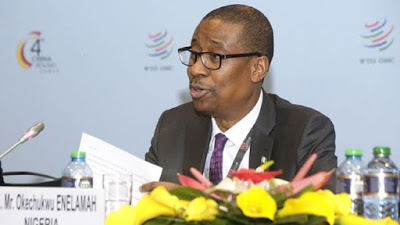The Nigerian Government has launched the Nigeria
Annual Trade Policy Report (NATPOR) drawn by the Nigerian Office for Trade
Negotiations (NOTN), which is to be published annually.
The Minister of Industry, Trade and Investment, Dr. Okechukwu Enelamah,
presented the document to the public on Tuesday in Abuja, the country’s
capital.
Annual Trade Policy Report (NATPOR) drawn by the Nigerian Office for Trade
Negotiations (NOTN), which is to be published annually.
The Minister of Industry, Trade and Investment, Dr. Okechukwu Enelamah,
presented the document to the public on Tuesday in Abuja, the country’s
capital.
The report aims to rely on statistics to monitor,
assess and re-negotiate Nigeria’s trading relationship with counterparts.
assess and re-negotiate Nigeria’s trading relationship with counterparts.
According to NAPTOR statistics, over 14 per cent
of the Nigerian workforce (import and export) equivalent of 10.8 million
people, are employed in trade activities.
It also noted that trade accounts for 18 per cent of GDP, second only to
agriculture (which accounts for 29.1 per cent of the GDP).
of the Nigerian workforce (import and export) equivalent of 10.8 million
people, are employed in trade activities.
It also noted that trade accounts for 18 per cent of GDP, second only to
agriculture (which accounts for 29.1 per cent of the GDP).
The report stated that in terms of percentage,
this was a decrease of about 18.5 per cent in trade value between 2014 and
2015. The decrease in 2015 reflected the recession in economic activities due
to the sharp decline in oil receipts. There was a slight increase in 2016.
Stronger more positive performance is expected with Q4 figure in 2017.
this was a decrease of about 18.5 per cent in trade value between 2014 and
2015. The decrease in 2015 reflected the recession in economic activities due
to the sharp decline in oil receipts. There was a slight increase in 2016.
Stronger more positive performance is expected with Q4 figure in 2017.
NAPTOR also showed that trade statistics for the
three quarters of 2017, both in export and import, South Africa remained
Nigeria’s major trading partner in Africa. Within the Economic Community of
West African States (ECOWAS), Côte d’Ivoire assumed the top position in terms
of Nigeria’s imports from ECOWAS, while Togo maintained top position in terms
of Nigeria’s exports to ECOWAS, in the reported three quarters of 2017.
three quarters of 2017, both in export and import, South Africa remained
Nigeria’s major trading partner in Africa. Within the Economic Community of
West African States (ECOWAS), Côte d’Ivoire assumed the top position in terms
of Nigeria’s imports from ECOWAS, while Togo maintained top position in terms
of Nigeria’s exports to ECOWAS, in the reported three quarters of 2017.
Outside Africa, Europe remains Nigeria’s major
regional trading partner (both in export and import) through the three reported
quarters of 2017, followed by Asia.
Globally, India and the United States are Nigeria’s two top major trading
partners in export through the three quarters of 2017, while China and Belgium
are Nigeria’s two top trading partners in import through the three quarters of
2017.
regional trading partner (both in export and import) through the three reported
quarters of 2017, followed by Asia.
Globally, India and the United States are Nigeria’s two top major trading
partners in export through the three quarters of 2017, while China and Belgium
are Nigeria’s two top trading partners in import through the three quarters of
2017.
The report identifies the priorities in Nigeria’s
trade policy, and our use of trade policy as an instrument for structural
transformation for diversification, modernization, construction of regional and
global value chains, welfare enhancement, job creation. Gradually, working in
close coordination with the Industrial Policy and Competitiveness Advisory
Council, the government hopes to phase out export of primary products to which
value has not been added.
trade policy, and our use of trade policy as an instrument for structural
transformation for diversification, modernization, construction of regional and
global value chains, welfare enhancement, job creation. Gradually, working in
close coordination with the Industrial Policy and Competitiveness Advisory
Council, the government hopes to phase out export of primary products to which
value has not been added.
Enelamah similarly said access to Nigeria’s
market would no longer be free to investors.
He said those seeking market access must link their investments to industrial
activities to enhance regional and global value chains.
market would no longer be free to investors.
He said those seeking market access must link their investments to industrial
activities to enhance regional and global value chains.
“Access to Nigeria’s markets must no longer be
for free. Investors who seek market access in Nigeria to sell their goods and
services, must invest and connect to our industrial and manufacturing
activities. We must negotiate better than we have done so far, so that
investors who seek market access in Nigeria, must link their investments to
industrial activities to enable creation of regional and global value chains,”
Enelamah said.
for free. Investors who seek market access in Nigeria to sell their goods and
services, must invest and connect to our industrial and manufacturing
activities. We must negotiate better than we have done so far, so that
investors who seek market access in Nigeria, must link their investments to
industrial activities to enable creation of regional and global value chains,”
Enelamah said.





